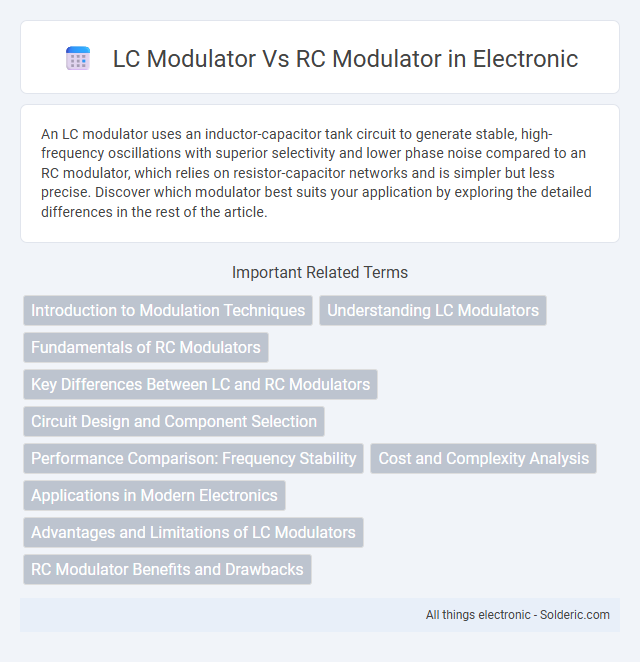An LC modulator uses an inductor-capacitor tank circuit to generate stable, high-frequency oscillations with superior selectivity and lower phase noise compared to an RC modulator, which relies on resistor-capacitor networks and is simpler but less precise. Discover which modulator best suits your application by exploring the detailed differences in the rest of the article.
Comparison Table
| Feature | LC Modulator | RC Modulator |
|---|---|---|
| Components | Inductor (L) and Capacitor (C) | Resistor (R) and Capacitor (C) |
| Frequency Range | High frequency applications (MHz to GHz) | Low to moderate frequency (kHz to MHz) |
| Quality Factor (Q) | High Q, better selectivity and stability | Lower Q, less selective |
| Power Consumption | Higher due to inductor losses | Lower power consumption |
| Physical Size | Usually larger due to inductors | Compact, no inductors |
| Application | RF modulation, transmitters, oscillators | Audio modulation, low-frequency circuits |
| Design Complexity | More complex due to inductor design | Simpler circuit design |
Introduction to Modulation Techniques
LC modulators utilize inductors and capacitors to create oscillating circuits with high frequency stability, making them ideal for radio frequency applications requiring precise tuning. RC modulators employ resistors and capacitors, offering simpler design and lower cost but generally lower frequency performance and stability. The choice between LC and RC modulators depends on the specific requirements for frequency range, stability, and circuit complexity in communication systems.
Understanding LC Modulators
LC modulators use an inductor (L) and capacitor (C) to form a resonant circuit that efficiently controls frequency and phase in modulation applications. These modulators provide high-frequency stability and are preferred in radio transmitters where precise tuning is required. Compared to RC modulators, LC modulators exhibit lower signal distortion and improved selectivity due to their resonant filtering characteristics.
Fundamentals of RC Modulators
RC modulators operate by using a resistor-capacitor network to shape the amplitude and frequency of signals in communication systems, providing simple and cost-effective modulation. These modulators rely on the charging and discharging properties of capacitors combined with resistive elements to control voltage levels, crucial for amplitude modulation (AM) and frequency modulation (FM) processes. Your understanding of RC modulators enables better design choices in low-frequency applications where signal distortion and bandwidth limitations are critical factors.
Key Differences Between LC and RC Modulators
LC modulators utilize inductors and capacitors to create a resonant tank circuit, which provides high selectivity and stable frequency generation, ideal for radio frequency applications. RC modulators use resistors and capacitors to form frequency-dependent phase shifts, offering simpler design and lower cost but with less frequency stability and selectivity. The key difference lies in LC modulators' superior frequency stability and quality factor (Q), while RC modulators prioritize ease of implementation and integration in low-frequency or audio applications.
Circuit Design and Component Selection
LC modulators utilize inductors and capacitors to form resonant circuits that offer high selectivity and low phase noise, making them ideal for high-frequency applications. RC modulators, relying on resistors and capacitors, provide simpler designs with easier component selection but suffer from higher phase noise and lower quality factor (Q), limiting their use to lower-frequency ranges. Choosing between LC and RC modulators depends on trade-offs in frequency stability, component precision, and circuit complexity inherent in each design approach.
Performance Comparison: Frequency Stability
LC modulators exhibit superior frequency stability due to their resonant tank circuits, which provide precise frequency control and minimal drift over temperature variations. RC modulators, relying on resistors and capacitors, tend to have greater frequency instability caused by component tolerances and temperature sensitivity. For applications requiring consistent frequency output, your choice should favor LC modulators to ensure optimal performance.
Cost and Complexity Analysis
LC modulators typically involve inductors and capacitors, resulting in higher component costs and increased design complexity compared to RC modulators, which use resistors and capacitors. The precise tuning required for LC circuits demands more careful layout and material quality, raising overall production expenses. You might prefer RC modulators if cost efficiency and simplicity are critical for your application.
Applications in Modern Electronics
LC modulators are widely used in RF communication systems due to their high selectivity and low power consumption, making them ideal for transmitting signals in radios and wireless devices. RC modulators find applications in audio frequency modulation and signal processing circuits, where their simpler design and stable frequency response suit low-frequency operations. Modern electronics leverage LC modulators for high-frequency and high-performance requirements, while RC modulators remain preferred for cost-effective and compact low-frequency modulation tasks.
Advantages and Limitations of LC Modulators
LC modulators offer high-frequency stability and superior selectivity due to their resonant LC circuits, making them ideal for precise tuning in RF communication systems. However, LC modulators can be more complex and costly to design and integrate compared to RC modulators, and their performance may degrade under temperature variations without proper compensation. Your choice of modulator depends on balancing the need for stability and selectivity against design complexity and cost constraints.
RC Modulator Benefits and Drawbacks
RC modulators offer simplicity and cost-effectiveness, making them ideal for low-frequency applications and basic signal modulation tasks. Their key drawback lies in limited frequency stability and bandwidth, which can result in signal distortion and reduced performance at higher frequencies. RC modulators are less suitable for high-precision or high-frequency modulation compared to LC modulators that provide better frequency selectivity and stability.
LC modulator vs RC modulator Infographic

 solderic.com
solderic.com